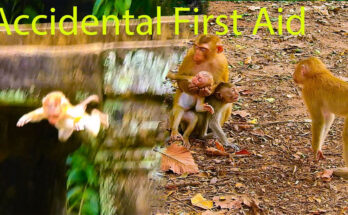Not to Do When Interacting with Monkeys
Monkeys are fascinating creatures—intelligent, curious, and often amusing to watch. They share many similarities with humans, from expressive faces to playful behavior, making them a popular attraction in wildlife sanctuaries, forests, and even urban areas where they roam freely. However, interacting with monkeys requires caution and respect. Many people make mistakes that can lead to unpleasant encounters, harm the monkeys, or even put themselves in danger. Here are some important things not to do when interacting with monkeys.
1. Do Not Feed Them Human Food
One of the biggest mistakes people make is offering food to monkeys. While it may seem like a kind gesture, human food can be harmful to them. Junk food, sugary snacks, and processed items can lead to obesity, diabetes, and other health issues. In some tourist areas, monkeys have become dependent on human food, making them aggressive when they don’t get what they expect. Feeding wild monkeys disrupts their natural diet and behaviors, making them less capable of foraging for food in the wild.
2. Do Not Make Direct Eye Contact
In the human world, eye contact can be a sign of confidence or connection, but in the monkey world, it can be perceived as a challenge or a threat. Staring at a monkey, especially a dominant male, can provoke aggression. If a monkey feels threatened, it may respond by baring its teeth, lunging, or even attacking. It’s best to observe monkeys from a respectful distance without locking eyes with them.
3. Do Not Touch or Try to Pet Them
Monkeys may look adorable, but they are not domesticated animals. Unlike dogs or cats, they do not enjoy being touched by humans, and attempting to pet them can result in bites or scratches. Wild monkeys are unpredictable, and sudden movements or physical contact can startle them. Moreover, monkeys carry bacteria and viruses that can be harmful to humans, and vice versa. Keeping a safe distance protects both parties from unnecessary risks.
4. Do Not Bring Out Shiny or Loose Objects
Monkeys are incredibly curious and intelligent, often fascinated by objects that shine, dangle, or look interesting. If you have sunglasses, cameras, jewelry, or even plastic bags in your hands, monkeys may try to snatch them. Many tourists have lost their belongings to mischievous monkeys who quickly grab and run away. To avoid this, keep your valuables secure and avoid waving objects around in front of monkeys.
5. Do Not Scream or Panic
If a monkey gets too close or starts acting aggressively, the worst thing you can do is scream, run, or make frantic movements. Monkeys interpret sudden movements as a sign of fear or weakness, which can trigger further aggression. If a monkey approaches you, remain calm, avoid eye contact, and slowly back away without making sudden gestures.
6. Do Not Try to Play With Baby Monkeys
Baby monkeys may seem irresistibly cute, but touching or playing with them is extremely risky. Mother monkeys are highly protective and will not hesitate to attack if they perceive a threat to their baby. Even if the mother is not nearby, other members of the troop may react aggressively. It is best to admire baby monkeys from a distance and avoid any interaction.
7. Do Not Imitate Their Expressions or Sounds
Some people think it’s fun to mimic monkey sounds or facial expressions, but this can lead to trouble. Monkeys use specific vocalizations and gestures to communicate warnings, dominance, or submission. If you unknowingly imitate an aggressive signal, you might provoke a negative reaction from the monkeys. Avoid unnecessary interactions that could be misinterpreted.
8. Do Not Feed Monkeys From Your Hand
Even in areas where feeding monkeys is allowed, it’s best to avoid direct hand-feeding. Monkeys can become overly reliant on humans for food and may start to expect food from every visitor. Some can become aggressive if they think you are withholding food. Instead, if feeding is permitted, leave food in a designated area rather than offering it directly.
9. Do Not Chase or Tease Them
Some tourists or children find it amusing to chase monkeys or tease them with food or toys. This is not only disrespectful but also dangerous. Monkeys may react defensively and attack. Additionally, teasing monkeys can stress them out and cause unnecessary aggression within their troop. Always treat wildlife with respect and observe without interfering.
10. Do Not Assume Monkeys Are Harmless
Many people mistakenly believe that monkeys are friendly and harmless because of their small size. However, monkeys can be strong and aggressive when provoked. They have sharp teeth and powerful limbs, capable of inflicting serious injuries. Additionally, they may carry diseases that can be transmitted to humans, such as rabies or herpes B virus. Never underestimate the potential risks of close interaction with wild monkeys.
Conclusion
Monkeys are incredible creatures, full of intelligence and personality. While it’s exciting to observe them in their natural habitats, it’s essential to do so with caution and respect. By avoiding common mistakes—such as feeding them, making eye contact, or touching them—you can ensure a safe and enjoyable experience for both yourself and the monkeys. Wildlife should be appreciated from a distance, allowing these amazing animals to thrive without human interference.
The next time you encounter monkeys, remember these guidelines and enjoy watching them in a way that respects their wild nature!


